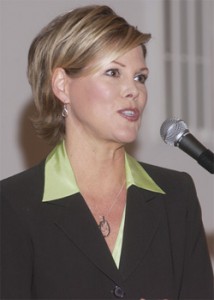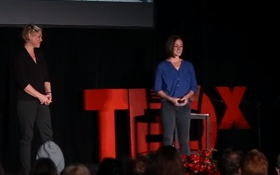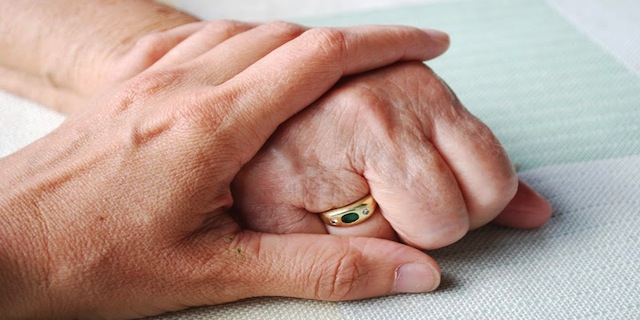Physician Parents
When your parents are both physicians, you have a unique perspective on the health care system. This is especially true for me because of the time when I grew up.
During those days, on call physicians didn’t leave the phone calls to an answering service at night. Our phone would ring, my father would answer it at all hours and would often leave for the hospital to meet his patient in the emergency department.
As children, we did not go to the doctor because our mother could determine what was wrong with us. Yes, we had a pediatrician and had all of our shots but for stomach flu or coughs and colds, our mom was there.
All of the physicians in the community were family friends; they would come to parties at our house; we would babysit their children; it was a given that if we did need care, we would get that care quickly.
My first experience with the failings of the healthcare system occurred when my father went into the hospital to have his gall bladder removed. By then around 20 something, I still saw with rose-colored glasses.
Dad decided that he would have surgery over a holiday weekend, since he and his medical office staff had taken that time off. Perhaps he did not realize the significant changes that were taking place in health care by then, or he did not seem to grasp that on a holiday weekend the nursing staff at the hospital would also be on vacation. The nurses he would have would be people who were not regular employees of the hospital.
My mother also did not understand. And this was just a routine gall bladder removal, nothing more.
Unfortunately, it was not routine. His gall bladder was calcified so, instead of a laparoscopy, his surgeon opted for an open incision and exploratory surgery in case of cancer.
Patient Safety Advocate: Pat Mastors
 I thought of this experience as I listened to Pat Mastors’ gripping stories at the 2013 Connected Health Symposium on October 25. Here is how she began
I thought of this experience as I listened to Pat Mastors’ gripping stories at the 2013 Connected Health Symposium on October 25. Here is how she began
“When you are in the trenches and things get tough you have keep your eye on simple things that are foolproof, that makes things work more efficiently…
I became a patient engagement evangelist…after the death of my father in the hospital 7 years ago for a surgery on his neck and he died 6 months later of complications from a hospital acquired C-diff infection…it opened eyes to the question, what can the patient and family do in the healthcare setting to make a difference?”
From Physician to Patient
After surgery, my father turned from physician to patient and he was not happy. He roared and bellowed as any true head of a lion pride would if his wishes were not met. And he terrified the nursing staff to such an extent that they seemed to forget him.
Sadly, his daughters did not know what to do for him. We were not savvy; had not learned the valuable lessons of patient engagement. We did not know to ask the question “What can the patient and family do in the healthcare setting to make a difference?”
Engaged Patient Caregiver
Pat Mastors described being an engaged patient caregiver.
“This spring I got to.. explore that question more closely than anybody wants to…that was when my 26 year old, who hiked the entire Appalacian trail last year, 2200 miles…suddenly couldn’t walk. She was diagnosed with a rare and paralyzing nerve disorder, Guillain-Barre syndrome….we were told…it would be 6 months to a year before she would recover.”
Staying With Loved Ones in Hospital
The first night in the hospital, after surgery, we left my father alone. This was not negligence on my mother’s part. My mother, adored my father, told him and us that everything would be fine because she firmly believed this. After all, she had been at this hospital before and had had no trouble.
The next morning and day, Dad seemed crankier than ever. He complained about being left alone the night before so, even though mom said he would be fine, I decided to stay overnight with him. I just could not leave him alone in that hospital room again.
That night, in and out of sleep, Dad started talking about Aristotle, Archimedes and Erasistratos as well as ascites. Because he sleepwalked and sleep-talked on a regular basis, I thought he was just sleep-talking again…
…If only I had known what he was talking about…if only I had known what to do. If only there had been Google….
Research, Research, Research
After her experience with her father, Pat Mastors knew what to do for her daughter, Jessica.
“…I’d known from my work that during care transitions and staff rotations little things fall through the cracks so we stayed in her room, all day and all night. We gathered research from my patient advocate network we googled everything.”
Heart Attack
Without knowledge, I did not realize that the nurses had not been keeping up with my father’s fluid intake and output. What he described to me, in what I thought was sleep-talking, was in fact, a complete description of the symptoms of someone who is in distress with abdominal bloating. When my mother and sisters arrived, I went home to sleep but told them about Dad’s night ramblings.
With the added pressure on his breathing and on his heart, not long after I left, Dad had a Heart Attack in the hospital.
A heart attack caused by the poor nursing care, the care transitions and staff rotations– the not A, not B, not C but the F team’s inadequate nursing care.
Engagement Makes A Difference
Patient and family engagement makes a difference in the care of hospitalized patients. Pat Mastors used the knowledge gleaned from the experience of her father and her own research, to help her daughter.
“We wrote things down, and then we distilled from that, what were the disconnects, so we were going to our medical team with sheets of research. We wanted to make sure of their body of knowledge or at least respectfully asking what do you think of this?
And the result was amazing! They stepped up their game, they did more research, they asked for our input when it was time to make a decision. We really, really worked as a team.
But during those times when…people are busy and they say things, ‘I’m sorry, there’s a shift change’ or ‘that’s not my job,’ I saw how our single-minded focus on the patient compelled them to connect with their innate mission. I saw this many times…”
Waking Up
My Dad’s heart attack woke me up! If a physician, who worked at a hospital, could receive such poor care in that same hospital that it caused him to have a heart attack, what was happening to non-physicians, non-healthcare professionals? What could I do to make a difference?
First, I continued my education. Second, over the next few years as family experienced serious health conditions, I plunged in with open eyes….and advocated for them. Third, I came up with a list of actions all caregivers and patients need to know:
- Take someone with you to doctor’s appointments
- Take notes during doctor appointments
- Do research
- Never leave a family member alone in a hospital
- As a caregiver, listen carefully to the patient and report anything unusual to the doctor
- Don’t take No for an answer!
Jessica’s Recovery
 For Jessica Mastors, her family’s advocacy made an enormous difference. The length of time Jessica stayed in the hospital was less than one third the average time that is spent by patients with her diagnosis . Her family believe that her recovery rate was due to their engagement, advocacy and empowerment which brought them into partnership with Jessica’s health care providers.
For Jessica Mastors, her family’s advocacy made an enormous difference. The length of time Jessica stayed in the hospital was less than one third the average time that is spent by patients with her diagnosis . Her family believe that her recovery rate was due to their engagement, advocacy and empowerment which brought them into partnership with Jessica’s health care providers.
Single-mindedness and assertiveness (that is often interpreted as aggressiveness), is a precious gift that you give yourself and your loved ones when you research, ask questions, make lists and keep on asking questions. Since that experience in the hospital with my father, I am always vigilant. I advise everyone, never leave your loved one in the hospital alone. Research and ask questions and demand the care that you and your loved one needs.






Hi Kathleen, so much nice to meet you!! I was reading your post and thinking things about the move of my heart after my fell down in chronicle pain.
As you say, I’m always thinking even I have not a completely answer to my ill, I have been so blessed and always think to another people who can’t be touched by others, doesn’t have medical supervision or a little money to ask for medicine.
Now I’m taking new challenges as a psychologist with the eye of health care, definitively all of us are exposed to be ill at any time during life so, we have a lot of work to help others.
I’ll be so glad to follow your blog and stay in touch.
Hugs from Mexico.
Have a nice day
Nice.
I’ve been “preaching” the same stuff as you have for years – yet recently, I’ve found that while successful in following my own advice based on my 16 yrs+ of experience and education – it is more doctor-doctor communication that is flawed and is a major roadblock.
What’s an ePatient to do with THAT issue? Short of renting a chicken suit and squawking about it on the entrance roofs of the local teaching hospitals – I’m at a loss.
Ideas?
Great point, Lori. You’ve identified the reason I decided to leave my own medical practice to make a push for the technologies that hopefully will help ALL healthcare stakeholders (patients, providers, and maybe even – gasp! – insurers) communicate better with each other.
I have experienced much of what each of you have watching the inadequate care my father has received since being diagnosed with cancer a few years ago. Frustrating would be an understatement.
I have joined a company named Medifr that I believe has the potential, with time (we are still working out how best to bring in the patient engagement piece), to do some great things. Here’s hoping for all of us, and our families, that we or some other like-minded souls get the provider communication piece figured out soon.
My family feels the same way. If someone is in the hospital, they are not ever alone. I am constantly on top of tests, results, treatment plans, etc. I intervene every single time I think I should. I call in palliative care when goals of care are not met (even though it irritates the docs but often saves the life of my family member). My mom has had been having recurrent UTIs and always becomes septic and she has almost died a half dozen times. Why? Because docs won’t listen! My mom doesn’t respond to oral antibiotics at the beginning of a UTI. She requires IV antibiotics. I know they work just as well, but not on her. How many times does she have to practically die before they listen? Last week, my mom had the early stages of another UTI. Finally, they listened and she received IV antibiotics before she left the Emergency Room. She’s on orals now (which work fine after IV antibiotics). For the first time, she didn’t have to be hospitalized because they broke protocol and listened. We weren’t asking for narcotics, just delivering the antibiotics differently. I am beyond exasperated at how much responsibility we have to take to make sure our loved ones don’t die from mistakes and arrogance. My mom is lucky because she has two adult children to navigate her health care. What happens to those who don’t? My heart breaks for them.
Thank you for your moving story of your family’s painful awakening to the threat of medical harm and for highlighting my dear friend and mentor Pat Mastors. Pat and I met because we both lost parents to a C. diff infection and I have learned a great deal from her advocacy, particularly how important patient and family engagement in healthcare is as a way to mitigate unintentional harm. Glad to have you both on the patient safety team.
Thank you for your comment. I look forward to reading about your work.
Kathleen,
We all learned the hard way but now you are teaching others so one day if we all keep sharing others will know what to do before they get there. Thank you and you have a good role model with Pat.
Warmly,
Patty
I agree and am happy to learn about your organization. Thank you for reading and commenting, Best, Kathleen
It is profoundly moving and a mark of your transcendence (and your writing gifts) that you can entwine your parent’s experience with those of others. You educate us, warn us, and inspire us, all at once. Good on ya.
Thank you so much Robin.
Everyone needs an advocate when thrust into the complex, and yes, dangerous system. A family member, a friend 24/7. Today there are professional advocates who can be hired to be there for you. Today there is a national certification for those who work at Advocates as well as for the consumer to know who they are and what they do.